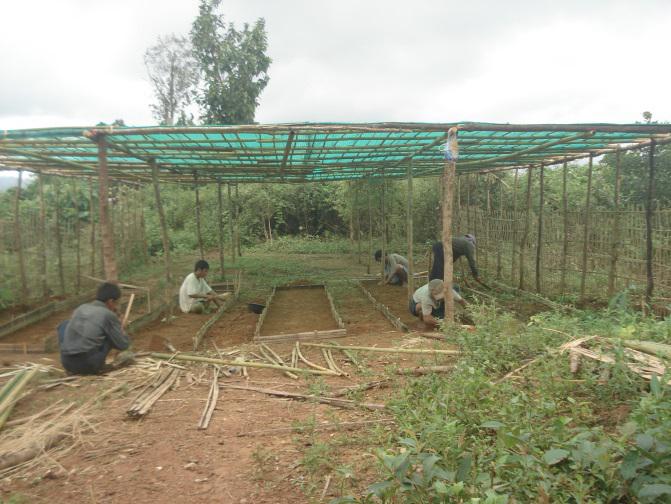U Myint Aung
The project will strengthen the participation of Chin tribes, who are expert large mammal hunters, in the conservation of elephants and other large mammals in/around the Rakhine Yoma Elephant Sanctuary (RYES), which is home to 100-150 wild elephants, through the negotiation of a no-hunting incentive agreement, training and elephant survey, capacity building and livelihood improvements.

Agro-Forestry Plantation.
In 2004, an international assessment concluded that as few as 1,200 wild elephants may remain in Myanmar, considerably less than 4,000-5,000 often cited and indicative of a rapid rate of decline. The 175,000-ha RYES, one of Myanmar's two largest elephant ranges, is currently under-resourced and cannot provide more that token protection.
Our target group is Chin people consisted of 27 families, comprising 130 people, located on the Gwa Road, which runs to the south of RYES. These families moved here in 2003-2004 from the Taungup Pass Road, 200 km to the north, having hunted out their original forests and large mammals.
After socio-economic survey in 2007, we negotiated an incentive agreement that linked support for rice supplements, education for their children, a clean water supply and a community forest to the complete cessation of hunting. The results have been very promising: the Chin have sold their hunting dogs and with the support of local authorities have established a high-value timber plantation.
We will negotiate a new incentive agreement in 2008. Specific issues to address in this new agreement are joint patrolling by Chin villagers, sanctuary and local authorities; improved data collection to document patrol routes and wildlife sightings; and use of these data in support of RYES planning and management. We will provide additional training in GPS and digital camera use.
We will continue to work with the Chin to identify priority livelihood needs. The local authorities have promised to allocate another 70 hectares for tree plantations and other crops and we have provided high-value timber tree seeds that have successfully sprouted. We will assist the Chin move their houses closer to the plantation and to hire school-teachers for their children education.
In December 2008-March 2009, we will conduct a survey of elephants and other large mammals using international standard methods to estimate total population, distribution, threats, and conservation status. Dr. Chris Wemmer, former director of the National Zoo, Smithsonian Institution, will advise on elephant monitoring techniques. Jake Brunner, program coordinator of IUCN-Vietnam, will advise on the incentive agreement.